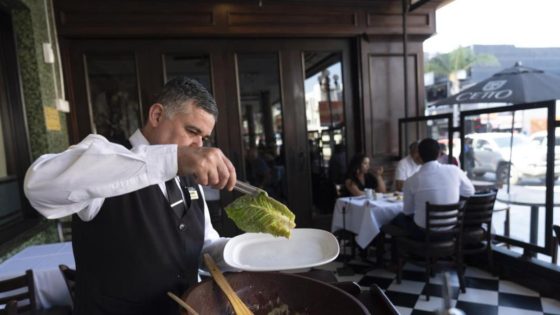Caesar salad, a global restaurant menu classic, is clocking up its 100th anniversary.
Italian immigrant Caesar Cardini is said to have invented the dish on July 4, 1924, at his restaurant, Caesar’s Place, in Tijuana, Mexico.
It was a steamy night, and Cardini was struggling to feed an influx of Californians who had crossed the border to escape Prohibition.
In the middle of the dining room, Cardini tossed whole Romaine leaves with ingredients he had on hand, including garlic-flavoured oil, Worcestershire sauce, lemons, eggs and Parmesan cheese.
A star was born.
Tijuana plans to commemorate the anniversary this month with a three-day food and wine festival, and the unveiling of a statue of Cardini.
Caesar’s – an elegant restaurant Cardini opened in Tijuana a few years after the salad was born – says it still makes as many as 300 Caesar salads each day.
Unlike some other menu items from the early 20th century – think creamed liver loaf or aspic – Caesar salad remains a perennial favourite.
About 35 per cent of US restaurants have Caesar salad on their menus, according to Technomic, a restaurant consulting firm.
And nearly 43 million bottles of Caesar salad dressing – or $US150 million ($A224 million) worth – have been sold in the US over the past year, according to Nielsen IQ.
Beth Forrest, a professor of liberal arts and applied food studies at the Culinary Institute of America, said it took a few years for Caesar salad to hit the mainstream.
Forrest said Caesar salad is ideal for the Western palate because it contains our two preferred textures: crispy and creamy.
The egg yolks and Parmesan cheese are also high in glutamate acids, which give the salad the rich, salty taste known as “umami”.
“It satisfies us in many hedonistic ways, while we can still feel virtuous. It is, after all, a salad,” Forrest said.
Caesar’s many variations have also given it staying power, experts say.
Chefs may add chicken, bacon or salmon, mix in kale or Brussels sprouts and make the dressing out of miso paste or tofu.
At Beatrix, a chain of five restaurants in Chicago that makes healthier versions of comfort foods, chef and partner Andrew Ashmore spreads a spoonful of yoghurt-based dressing at the bottom of the salad bowl and mixes it with capers, parsley, lemon vinaigrette and champagne vinegar before adding little gem lettuce, baby arugula, bread crumbs and a generous shaving of Grada Padano cheese.
“It’s our number one selling salad, and it has been since we opened 11 years ago,” Ashmore said.
“I couldn’t try to take it off the menu if I wanted to.”
Source Agencies


